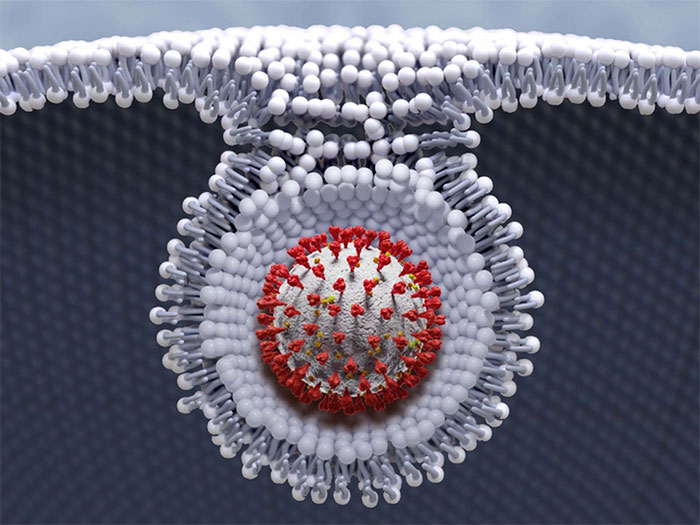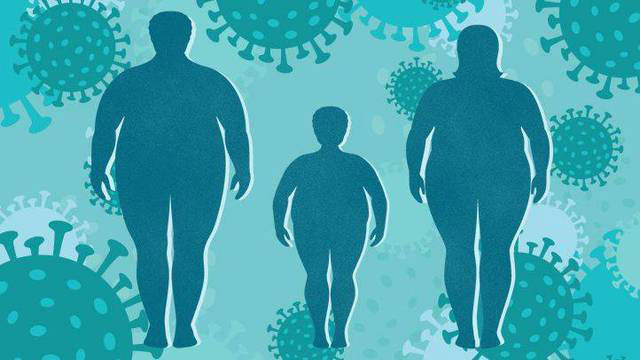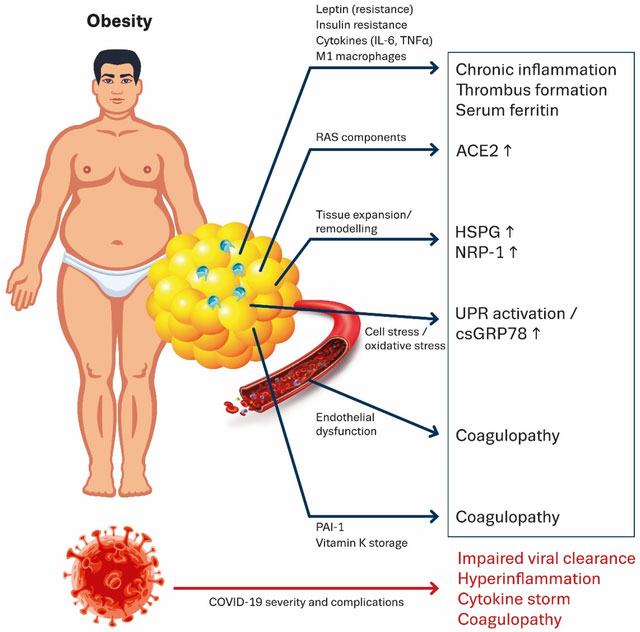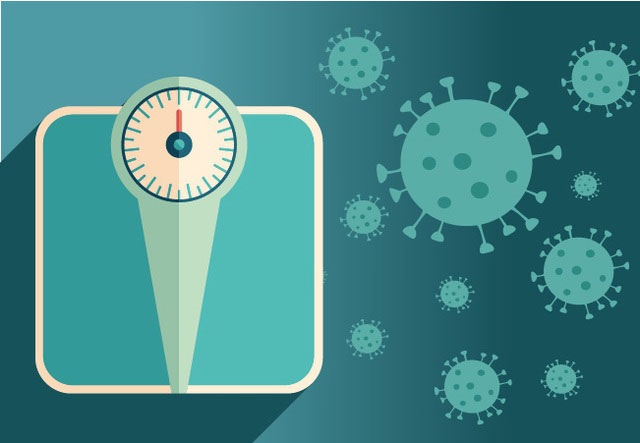The SARS-CoV-2 virus particularly favors fats; it prefers to nest in fat and uses fat as a reserve energy source.
After nearly 3 years of the pandemic, humanity looks in the mirror and sees itself gaining weight. A study conducted in Italy found that 1 in 2 people gained weight during the Covid-19 period. A similar figure was reported in the United States, with 61% of adults having gained weight.
According to an analysis of 19 million medical records stored by Epic Systems, one of the largest medical record companies in the U.S., Covid-19 caused 39% of patients to gain at least 1.1 kg, 27% to gain less than 5.6 kg, 10% to gain more than 5.6 kg, and 2% to gain over 12.4 kg.

Covid-19 knows how to “hack” into the body’s fat processing system, causing us to increase fat accumulation.
Some scientists have even coined the term “COVID-15“ to refer to the average weight gain of 15 pounds (5.6 kg) during the pandemic. The reason cited is that social distancing has led to reduced physical activity. Additionally, people have increased their consumption of processed foods and ready-to-eat meals rich in fats and calories during the pandemic.
The stress caused by the pandemic has also placed the body in a slow metabolic state, with high cortisol levels, or stress hormone in the blood, contributing to abdominal fat accumulation.
However, according to a new study published in Nature Communications, the act of contracting Covid-19 itself may also lead to weight gain. This is because the SARS-CoV-2 virus possesses a unique ability; it knows how to “hack” into the body’s fat processing system, causing us to increase fat accumulation.
Some lipid metabolic processes in the body after contracting Covid-19 can increase up to 64 times normal levels. This is because SARS-CoV-2 particularly favors fats, preferring to nest in fat and use it as a reserve energy source.

The SARS-CoV-2 virus particularly favors fats.
The Virus Loves Fat in the Human Body
Fat or lipids in your body are a form of inert substance, primarily tasked with storing energy. When you consume too much food, especially sugar, the unused energy is converted into body fat.
Adipose tissue is primarily formed by fat cells, also known as adipocytes. However, adipose tissue also contains pre-adipocytes, cells that can mature into fat cells or various immune cells, including macrophages.
Previously, adipose tissue was known to be a hiding place for influenza and HIV viruses. By infecting these tissues, viruses can evade the human immune system and treatment measures such as antiviral drugs.
A study published on the online platform BioRxiv late last year showed that SARS-CoV-2 also prefers to nest in human adipose tissue. “If you are obese, fat is clearly the largest single organ in your body. The coronavirus can infect and nest in it“, said Dr. David Kass, a cardiovascular professor at Johns Hopkins University.
“Whether they damage or kill adipose tissue or, in the best case, merely use it as a breeding ground – that doesn’t matter. What’s important is that adipose tissue has become a reservoir for the virus.”

The SARS-CoV-2 virus prefers to nest in human adipose tissue.
A study in Obesity Reviews found that obese individuals are 113% more likely to contract Covid-19 with more severe symptoms than those of normal weight. They also have a 74% higher rate of needing ICU (intensive care unit) admission and a 48% higher mortality rate.
Although obese individuals often have multiple underlying health conditions, scientists are increasingly finding evidence that their risk of contracting and dying from Covid-19 is directly related to their weight.
Even young overweight individuals, who have not developed any underlying conditions, can die from Covid-19. Research shows that when SARS-CoV-2 infects fat cells, it can trigger inflammatory responses and worsen the progression of Covid-19.
“The key point is that the virus can directly infect fat cells. And whatever happens to adipose tissue will not remain in adipose tissue. It also affects neighboring tissues,” said Dr. Philipp Scherer, a scientist studying fat cells at UT Southwestern Medical Center in Dallas.
The Virus Will Fat You Up
This is the finding from a new study conducted by the Oregon Health & Science University. In this study, scientists cultured the SARS-CoV-2 virus on two human cell lines and observed its effects on the metabolism of 400 types of lipids.
They found that the virus altered 80% of the fats in one cell line. The figure for the other line was over 50%. Notably, some lipid metabolic processes increased by up to 64 times.
The most affected fat was triglycerides, a form of stored fat in the body. “When the virus replicates, it requires a continuous energy supply. More triglycerides can meet that energy demand for the virus in the form of fatty acids,” said Associate Professor Fikadu Tafesse, a co-author of the new study.
Tafesse and his colleagues discovered that somehow, after the SARS-CoV-2 virus infects human cells, it can “hack” into the fat metabolism system and cause the cells to produce more lipids.

The virus can directly infect fat cells.
“Lipids are an important part of every cell. They are an attractive target for viruses,” said Dr. Jennifer Kyle, a biomedical scientist and co-author of the new study. Kyle and Tafesse suspect that the SARS-CoV-2 virus used 24 of its 29 proteins to interfere with fat metabolism in human bodies.
Since they can hide in fat, the first thing the virus wants to do after infecting the body is to build nests for itself. It will cause us to synthesize more fat, creating a “warm,” safe, and nutrient-rich environment for its proliferation.
This effect was previously observed by Tafesse when studying the HIV and Zika viruses.
Weight Loss Drugs May Prevent Virus Replication
Now, if the logic is that the virus can nest in fat and utilize that reserve energy to proliferate, scientists want to know if weight loss could offer benefits for the prevention and treatment of Covid-19.
In their experiment, they used Orlistat, a weight loss drug approved for human cells. Orlistat works by inhibiting lipase, an enzyme that catalyzes the breakdown of fats.
The result was that cells treated with Orlistat reduced the breakdown of triglycerides into fatty acids, decreasing the energy supply for the virus and blocking its replication within just 48 hours.
Even more remarkably, this drug was effective against all tested SARS-CoV-2 variants, from alpha, beta to gamma and delta.

Overweight and obese individuals should plan for weight loss as the pandemic continues.
Based on the data from these new studies, scientists suggest that overweight and obese individuals should plan for weight loss as the pandemic continues to surge globally. The World Health Organization (WHO) reported an 18% increase in Covid-19 cases in 110 countries, the highest level since April. This surge is primarily due to the spread of the Omicron variants BA.4 and BA.5, which have advantages in transmissibility and effective immune evasion.
Weight loss not only helps prevent severe symptoms when infected with the SARS-CoV-2 virus but also improves overall health. Studies show that losing just 5-10% of body weight can help lower blood pressure, reduce sleep apnea, decrease inflammation, lower “bad” cholesterol linked to cardiovascular disease, and reduce the risk of diabetes and cancer.


















































